Hands are the main pathways of germ transmission during health care. Hand hygiene is therefore the most important measure to avoid the transmission of harmful germs and prevent health care-associated infections – World Health Organisation
COVID19 is rampant worldwide , and the disease declared as a pandemic has played havoc across nations. We can stay away from it if everyone undertakes safe practices to prevent this disease. Being a contagious one, it can be transmitted by touch. Just like during an illness, though we take various medicines and remedies for it; the root of many of the diseases that afflict us is in our unclean hands.
Shelter Associates, an NGO based in Pune has been working actively in the informal settlements of Maharashtra to transform the lives of the urban poor through the provision of sanitation and hygiene since 1994. Realizing the need to provide relief during the World’s worst hit pandemic and ensuring the well-being of communities during this time, Shelter Associates have been partnering with global organisations to work towards a universal goal of a COVID free nation.
COMMUNITY MOBILISATION AROUND HAND WASHING
The objective of all of SA initiatives is not only to implement projects but to realise tangible positive change in the quality of the lives of the most vulnerable citizens. Mobilising communities has been one of the greatest strengths of Shelter Associates. Carefully strategised data driven planning helps us to have contextualised, meaningful discussions with slum residents through various awareness activities with women, children, adolescent girls, boys and men to bring about a behavioural change and thus develop good habits. In recent times, hand washing has gained greater significance and to inculcate that habit, SA conducts hand washing activities through hand wash demonstration songs and informal games such as snake & ladder and maze activity customised to impart knowledge on COVID19 and hand washing. Spatial maps are developed by SA to help community volunteers organise mobilisation and engage communities from different slum pockets.

Sing-along Hand wash demonstration
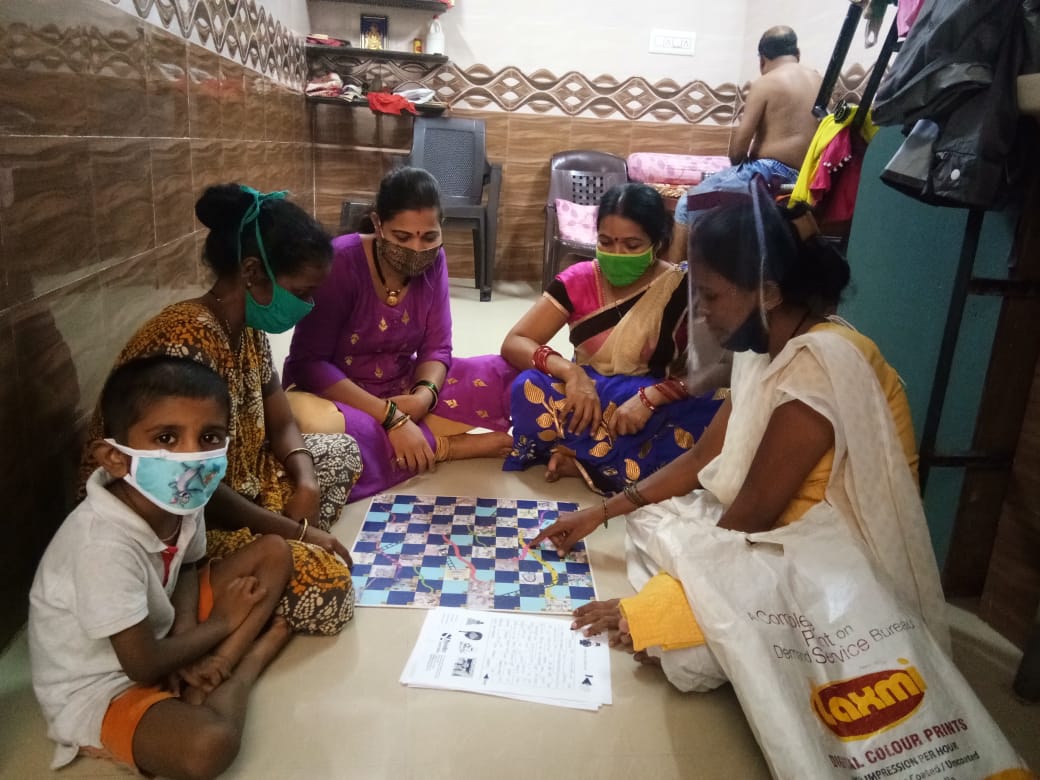
Informal activity games
DISTRIBUTION OF 5 LAKH SOAPS TO FRONTLINE WORKERS
Shelter Associates has been working with UNICEF India since August 2020 to facilitate its ‘Flush the Virus’ program in selected COVID19 affected slums of Pune, Thane and Navi Mumbai in Maharashtra, India. The partnership involves installation of pedal operated hand wash stations near community toilets in slums, awareness on safe use of community facilities, encouraging the use of household Toilets, mobilizing communities on COVID19 prevention & 100% mask use.

Girl from the community holding soaps
Shelter Associates has further joined the cause with UNICEF in providing support to selected slums and municipal corporations of Pune, Thane, Navi Mumbai, Panvel and Kolhapur to combat the pandemic around WASH by inculcating the habit of handwashing.
With support from Hindustan Unilever Ltd., 5 lakh Moti soaps have been distributed to COVID warriors including front line workers, ragpickers, sanitary and healthcare workers and slum households where there was a high prevalence of the pandemic.
This will definitely be both a public awareness and health protection initiative for the cleaning staff and the slum dwellers who are working as sanitation envoys. Therefore, I truly thank Hindustan Lever, UNICEF and Shelter Associates, says Sudhakar Deshmukh, Panvel Municipal Commissioner.

Distributing soaps to slum families
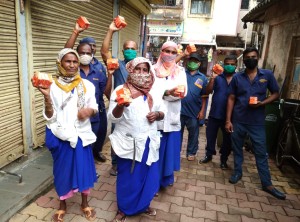
Soaps given to sanitation workers
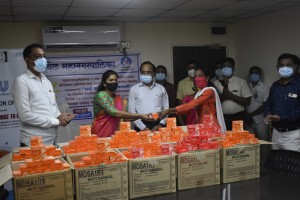
Soaps given to Municipal Corporations
GLOBAL HAND WASH DAY 2020
October 15 is celebrated around the world as ‘World Handwashing Day’ to raise awareness about hand hygiene. Shelter Associates, UNICEF and various Municipal Corporations have jointly celebrated the day in the informal settlements of Maharashtra.
Municipal Corporations have jointly celebrated the day in the informal settlements of Maharashtra. The slum settlements of 4 cities of Maharashtra namely Laxmi nagar, Vadarwadi and Ambedkar nagar in Pune; Chinchpada in Navi Mumbai; Lokmanya nagar in Thane; and Kanan Nagar in Kolhapur were selected to conduct various awareness activities around the Global Hand Wash Day. A week-long celebration was underway in these settlements from 12th to 16th October 2020
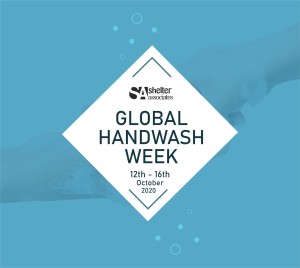
Global Handwash Week
Based on the Global Hand washing Theme, various competitions organized were:
- Rangoli competition
- Poster making competition
- Essay competition
- Slogan writing competition
- Video making competition
- Poem writing competition
- Live hand wash demonstrations
- Awareness Rally
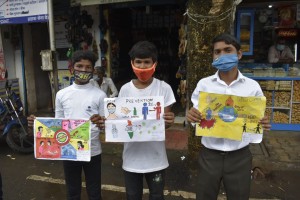
Poster Making Competition
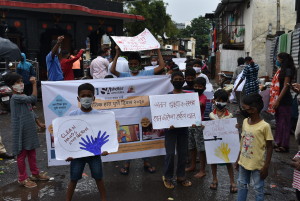
Awareness Rally on hand washing

Rangoli Competition
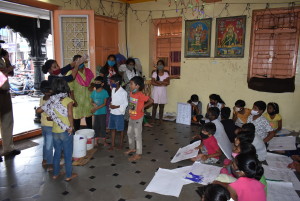
Hand washing demonstrations to children

Health talk by Medical Officers
The program in different slums were visited by the respective Municipal Corporation officials, sanitary officers along with Shelter Associates representatives. Over 2000 individuals were impacted directly and indirectly through the Global Hand wash Week celebration.
Clean hands are essential to health, whether in an emergency or day-to-day life. The importance of hand washing has been further elevated by the fact that COVID19 has spread all over the country. Therefore to protect our communities and provide relief to these COVID warriors and vulnerable slum families, Shelter Associates encourages good hand washing habits through awareness campaigns, live demonstrations, competitions and soap distribution.




